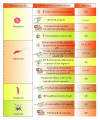B-Cell Response during Protozoan Parasite Infections
- PMID: 22315659
- PMCID: PMC3270435
- DOI: 10.1155/2012/362131
B-Cell Response during Protozoan Parasite Infections
Abstract
In this review, we discuss how protozoan parasites alter immature and mature B cell compartment. B1 and marginal zone (MZ) B cells, considered innate like B cells, are activated during protozoan parasite infections, and they generate short lived plasma cells providing a prompt antibody source. In addition, protozoan infections induce massive B cell response with polyclonal activation that leads to hypergammaglobulnemia with serum antibodies specific for the parasites and self and/or non related antigens. To protect themselves, the parasites have evolved unique ways to evade B cell immune responses inducing apoptosis of MZ and conventional mature B cells. As a consequence of the parasite induced-apoptosis, the early IgM response and an already establish humoral immunity are affected during the protozoan parasite infection. Moreover, some trypanosomatides trigger bone marrow immature B cell apoptosis, influencing the generation of new mature B cells. Simultaneously with their ability to release antibodies, B cells produce cytokines/quemokines that influence the characteristic of cellular immune response and consequently the progression of parasite infections.
Figures
References
-
- von der Weid T, Honarvar N, Langhorne J. Gene-targeted mice lacking B cells are unable to eliminate a blood stage malaria infection. Journal of Immunology. 1996;156(7):2510–2516. - PubMed
-
- Kumar S, Tarleton RL. The relative contribution of antibody production and CD8+ T cell function to immune control of Trypanosoma cruzi. Parasite Immunology. 1998;20(5):207–216. - PubMed
-
- Myers CD. Role of B cell antigen processing and presentation in the humoral immune response. FASEB Journal. 1991;5(11):2547–2553. - PubMed
LinkOut - more resources
Full Text Sources
Research Materials


